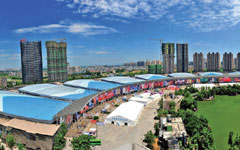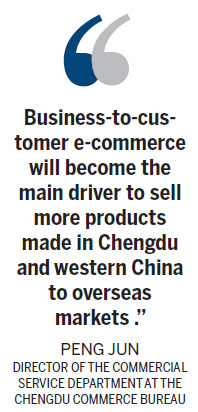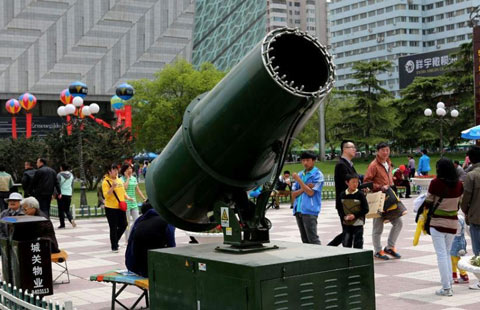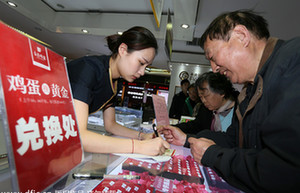E-commerce fuels Chengdu's trade growth
By Zhong Nan and Li Yu in Chengdu and Lu Haoting in Beijing (China Daily) Updated: 2014-05-05 09:25"To meet the demand for goods transportation to overseas destinations ordered through e-commerce platforms, we are making plans to strengthen the city's ability for logistics services, from rail to air," Peng says.
Chengdu also is expecting that an express rail route that opened in April 2013, linking Chengdu and Lodz, Poland, will operate bi-directional service this year. The international rail hub in Chengdu will assist Chinese cross-border e-commerce companies in buying more European goods and selling them back to the domestic market.
 |
 |
Chen Zhongwei, director of the Chengdu logistics office, says Chengdu's cross-border e-commerce companies will be the biggest beneficiaries from this rail route, as they won't need to send their goods to port cities any longer and wait for months for the arrival of shipments in Europe. The rail line "reversed the concept that an export-oriented economy must rely on seaports, turning Chengdu's inland geographical disadvantage into an advantage for exporting to Europe".
After arriving in Poland, Chinese goods can be distributed to markets throughout Europe, such as Germany, France and the Netherlands, within one to three days. The express rail is a month faster than ocean shipping and costs only a quarter of air cargo transportation. A single trip currently takes 12 to 14 days.

DHL Global Forwarding also is finding Chengdu's cross-border e-commerce platform for high-end goods, such as pharmaceutical, food and chemical products, to be another attractive use for this rail route. In January, the German company introduced its first temperature-controlled China-Europe rail service between Chengdu and Lodz.
"This service will provide a flexible shipping solution for temperature-sensitive European products, such as German drugs and vaccines, Dutch dairy products, French wine and processed Spanish agricultural products, to China, after the bi-directional rail service becomes operational," says Hou Hanping, a professor of logistics management at Beijing Jiaotong University. "These goods previously were unable to use the fast and cost-effective transcontinental west rail corridor, especially during winter and summer."
The central government offered incentives to encourage the development of cross-border e-commerce in January this year. Companies can enjoy a refund or tax-free policies for consumption and valued-added taxes.
Eager to develop more overseas markets, Chengdu plans to open three more international air routes - to San Francisco, Moscow and Sri Lanka - this year, and make flights to Europe, the Middle East and other Asian countries more frequent. The city is also working on a second airport to ease air traffic congestion and enlarge the space and facilities for air cargo. With a budget of 54.5 billion yuan, construction work is set to begin next year.
- China to issue discount treasury bonds
- China IPO prospectus disclosures rise to 211
- Prospects brighter for foreign banks in China
- Forecast for foreign trade appears grim
- Facebook to provide cross-platform tools for developers
- China IPO prospectus disclosures rise to 211
- Huge mist cannons attract people in Lanzhou
- Asia banking on expansion
















